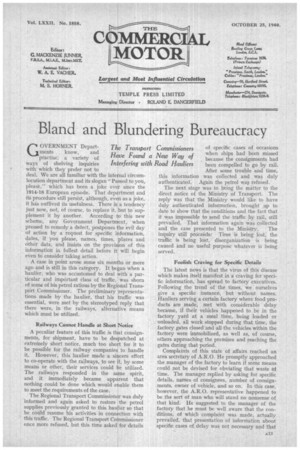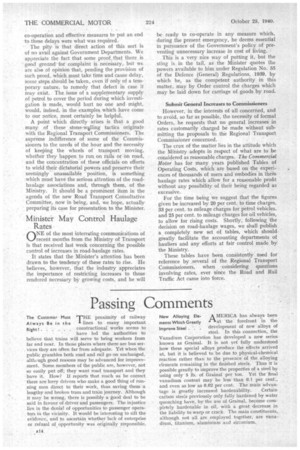Bland and Blundering Bureaucracy
Page 15

Page 16

If you've noticed an error in this article please click here to report it so we can fix it.
GOVERNMENT Departments know, and practise; a variety of ways of shelving inquiries withwhich they prefer not to deal. We are all familiar with the internal circumlocution department and its slogan " Passed to you, please," which has been a joke ever since the 1914-18 European episode. That department and its procedure still persist, although, even as a joke, it has outlived its usefulness. There is a tendency just now, not, of course, to replace it, but to supplement it by another. According to this new scheme, any Government Department, when pressed to remedy a defect, postpones the evil day of action by a request for specific information, dates, if you please, names, times, places and other data; and insists on the provision of this information in fullest detail before it will begin even to consider taking action.
A case in point arose some six months or more ago and is still in this category. It began when a haulier, who was accustomed to deal with a particular and imp:a-taut class of traffic, was shorn of some of his petrol rations by the Regional Transport Commissioner. The preliminary representations made by the haulier, that his traffic was essential, were met by the stereotyped reply that there were, in the railways, alternative means which must be utilized.
Railways Cannot Handle at Short Notice A peculiar feature of this traffic is that consignments, for shipment, have to be despatched at extremely short notice, much too short for it to be possible for the railway companies to handle it. However, this haulier made a sincere effort to co-operate with the railways, to see if, by some means or other, their services could be utilized. The railways responded in the same spirit, and it immediately became apparent that nothing could be done which would enable them to meet the requirements of the case.
The Regional Transport Commissioner was duly informed and again asked to restore the petrol supplies previously granted to this haulier so that he could resume his activities in connection with this traffic. The Regional Transport Commissioner once more refused, but this time asked for details of specific cases of occasions when ships had been missed because the consignments had been compelled to go by rail. After some trouble and time, this information was collected and was duly authenticated. Again the petrol w4 refused.
The next stage was to bring the matter to the direct notice of the Ministry of Transport The reply was that the Ministry would like to have duly authenticated information, brought .up to date to show that the conditions and the fact that it was impossible to send the traffic by rail, still prevailed. That information again was collected and the case presented to the Ministry. The inquiry still proceeds: Time is being lost; the traffic is being lost, disorganization • is being caused and no useful purpose whatever is being served.
Foolish Craving for Specific Details The latest news is that the virus of this disease which makes itself manifest in a .craving for specific information, has spread to factory executives. Following the trend of the times, we ourselves give a specific instance, but without names. Hauliers serving a certain factory where food products are made, met with considerable delay because, if their vehicles happened to be in the factory yard at a meal time, being loaded or unloaded, all work stopped during that time, the factory gates closed and all the vehicles within the factory were immobilized, as well as, of course, others approaching the premises and reaching the gates during that period.
Complaints of this state of affairs reached an area secretary of A.R.O. He promptly approached the manager of the factory to learn if some means could not be devised for obviating that waste of time. The manager replied by asking for specific details, names of consignees, number of consignments, owner of vehicle, and so on. In this case, however, the A.R.O. representative happened to be the sort of man who will stand no nonsense of that kind. He suggested to the manager of the factory that he must be well aware that the conditions, of which complaint was made, actually prevailed, that presentation of information about specific cases of delay was not necessary and that co-operation and effective measures to put an end to these delays were what was required.
The pity is that direct action of this sort is of no avail against Government Departments. We appreciate the fact that some proof. that there is good ground for complaint is .necesary, but we are also of opinion that, pending the provision of such proof, which must take time and cause delay, some steps should be taken, even if only of a temporary nature, to remedy that defect in case it may exist. The issue of a supplementary supply of petrol to cover the period during which investigation is made, would hurt no one and might, would, indeed, in the examples which have come to our notice, most certainly be helpful. A point which directly arises is that a good • many of these _stone-willing tactics originate with the Regional Transport Commissioners. The supreme indifference of some of the Commissioners to the needs of the hour and the necessity of keeping the wheels of• transport moving, whether they happen to run on rails or on road, • and the concentration of these officials on efforts to wield their dictatorial powers and preserve their seemingly unassailable position, is something -which must have the serious attention of the roadhaulage associations and, through them, of the Ministry. It should be a prominent item in the agenda of the new Road Transport ConsultatiVe Committee, now in being, and, we hope, actually preparing its case for presentation to the Minister.
Minister May Control Haulage Rates ONE of the most interesting communications of recent months from the Ministry of Transport is that received last week concerning the possible control of increases in road-haulage rates.
It states that the Minister's attention has been drawn to the tendency of these rates to rise. He • believes, however, that the industry appreciates the importance of restricting increases to those rendered necessary by growing costs, and he will be ready to co-operate in any measure which, during the present emergency, he deems essential in pursuance of the Government's policy of preventing unnecessary increase in cost of living.
This is a very nice way of putting it, but the sting is in the tail, as the Minister quotes the powers available to him under Regulation No. 55 of the Defence (General) Regulations, 1939, by which he, as the competent authority in this matter, may by Order control the charges which may be laid down for carriage of goods by road.
Submit General Increases to Commissioners However, in the interests of all concerned, and to avoid, so far as possible, the necessity of formal Orders, he requests that no general increases in rates customarily 'charged be made without submitting the proposals to the Regional Transport Commissioner concerned.
The crux of the matter lies in the attitude which the Ministry adopts in respect of what are to be considered as reasonable charges. The Commercial Motor has for many years published Tables of Operating Costs, which are based on the experiences of thousands of users and embodies in them haulage rates which allow for a reasonable profit without any possibility of their being regarded as excessive.
For the time being we suggest that the figures given be increased by 20 per cent. to time charges, 33 per cent. to mileage charges for petrol vehicles, and 25 per cent. to mileage charges for oil vehicles, to allow for rising costs. Shortly, following the decision on road-haulage wages, we shall publish a completely new set of tables, which should greatly facilitate the accounting departments of hauliers and any efforts at fair control made by the Ministry.
These tables have been consistently used for reference by ,several of the Regional Transport Commissioners, when considering questions involving rates, ever since the Road and Rail Traffic Act came into force.




















































